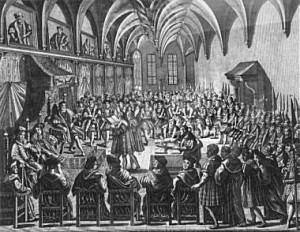
Although the particular confessions of the Lutheran Church, such as the Augsburg Confession (shown being presented on June 25, 1530), date to the 16th century, the truth they confess is drawn from Holy Scripture and is the faithful confession of the Christian Church since it was founded by Christ Himself. Image source.
Based on the Bible and expressed by the Lutheran Confessions, we believe that the God Man Jesus Christ was born, lived, and died to save all people from their sins and that, to those who believe in Him, He freely gives that forgiveness of sins through the pure preaching of His Word and the right administration of His Sacraments. Who Jesus is, what He has done, and how He gives out the benefits of that work are the most important questions to answer in this life. At the same time, they are only three of many different aspects of the one jewel that is Christian teaching or doctrine.
Truth is not relative. As Lutheran Christians, we do not pick and choose what to believe, but we believe, teach, and confess the entirety of the faith always held everywhere by the one, holy, Christian, and apostolic Church. This faith that we believe is drawn from the Bible and expressed not only in the earlier Apostolic Creed, Nicene Creed, and Athanasian Creed but also in the later Lutheran writings such as the Augsburg Confession. The following are some of the key articles or points we believe, as drawn largely from that Confession.
• Triune God – one divine essence and three persons (namely, Father, Son, and Holy Spirit), Who created and preserves all things, visible and invisible
• Original sin – what all people are born in since the first man and woman fell into sin (caused, for example, by the will of the devil), meaning that all people by nature do not fear or trust God as they should, are also full of evil inclinations, and on those accounts deserve the eternal wrath of God (while people have some measure of free will to live an outwardly honorable life, they cannot make themselves acceptable to God without the grace, help, and activity of the Holy Spirit)
• The Son of God – the Second Person of the Blessed Trinity, Who took on a human nature in the womb of the Virgin Mary, has united in His one person both His divine and human nature, and as the one God man Jesus Christ was born, suffered, crucified, and was buried to be a sacrifice not only for original sin but also for all actual sin and guilt to satisfy the wrath of God that we deserve, and truly rose from the dead, ascended into heaven, sits at the right hand of God to rule and make holy and comfort all who believe in Him, and will come again on the last day to raise all the dead and judge the living and the dead, giving believers eternal life and unbelievers eternal punishment, with no worldly kingdom for believers prior to the resurrection of the dead
• Justification (or forgiveness of sins, or righteousness before God, or salvation) – obtained not by our own merits or works but freely by grace for Christ’s sake, through faith, when we believe that He suffered for us and that for His sake our sin is forgiven and righteousness and eternal life are given to us
• Office of the Ministry – for us to obtain saving faith, God instituted this Office, that is, provided the Gospel and Sacraments, through which He gives the Holy Spirit, Who works faith, when and where He pleases, in those who hear the Gospel that those who believe have a gracious God on account of Christ (no one in Lutheran churches preaches or administers the sacraments without being ordained into this Office and properly called to that Office)
• Repentance – consists of terror over sin and faith that believes sin is forgiven for Christ’s sake (even after one has been baptized), with good works, the fruits of repentance, following naturally
• Sanctification – being made holy as evident from the fruits of the Spirit or good works produced by saving faith, which works are commanded by God and done for His sake (but not as if they merit us God’s favor)
• The Church – the never-ending assembly of all believers among whom the Gospel is purely preached and the Sacraments rightly administered (whether or not human ceremonies are observed uniformly in all places, though they contribute to peace and good order in the church), but among which assembly on this earth false Christians, hypocrites, and even open sinners remain
• Sacraments – signs and testimonies of God’s will toward us that not only identify Christians outwardly but are also for the purpose of awakening and strengthening faith, properly received in faith
o Baptism – the washing of water and the Word that offers the grace of God to all, including children, and so under normal circumstances is necessary for salvation
o Private Confession and Individual Absolution – individuals privately confess to their pastor the sins that trouble them most for the sake of individually receiving God’s forgiveness from their pastor acting in Christ’s place and by His command
o The Lord’s Supper – the true body and blood of Christ present under the forms of bread and wine, distributed to and received by those who have been instructed, examined, and absolved, giving those who believe the forgiveness of sins and so also life and salvation
• Civil Government – all government in the world and all established rule and laws instituted and ordained by God for the sake of good order, which government Christians must be subject to (in all that can be done without sin) and roles in which government Christians may serve
For our comparison of Lutheran, Calvinist, and Arminian views on the “Five Points” of Calvinism, see here. For additional general information on what we believe, teach, and confess, see The Lutheran Church—Missouri Synod website, where you can find more about such things as Belief and Practice (including a pamphlet series that addresses doctrinal topics, moral issues, and concerns in the church), Who Jesus is, the Lutheran Confessions, Doctrine, and answers to Frequently Asked Questions. You might also check out the Christian Cyclopedia, which is “a one-volume compendium of historical and theological data, ranging from ancient figures to contemporary events.”

